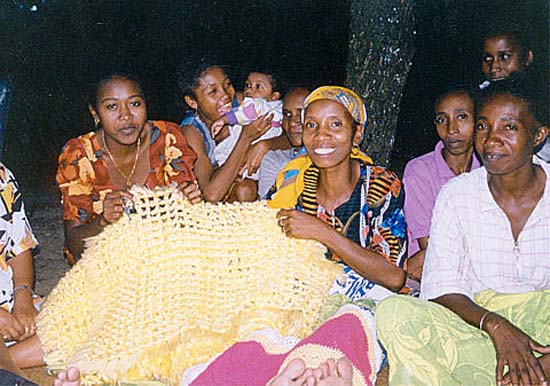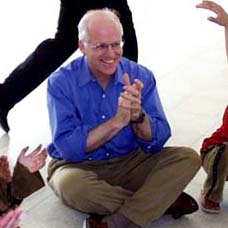
Hundreds came, one by one, to the clearing between the old brick church and the rectory. I thanked them again for taking care of me as a young woman, for praying that I would one day be blessed with Caitlin, my daughter, and for welcoming me back with such open arms.
Congo Kinshasa RPCV Beth Duff-Brown writes: As the villagers did the last time I visited, they sang songs throughout the night at the party I had arranged
AP Blog: Goodbyes in Congo
Associated Press
AP chief of bureau for Canada, Beth Duff-Brown, is in the Democratic Republic of Congo, which she visited many times as a West Africa correspondent in the mid-1990s. She has returned to visit to a remote village in central Congo, where she was a Peace Corps volunteer from 1979 to 1981.
---
MONDAY, Sept. 11, 6:30 p.m. local
KANANAGA, Democratic Republic of Congo - As the villagers did the last time I visited, they sang songs throughout the night at the party I had arranged. Hundreds came, one by one, to the clearing between the old brick church and the rectory. I thanked them again for taking care of me as a young woman, for praying that I would one day be blessed with Caitlin, my daughter, and for welcoming me back with such open arms.
There wasn't enough goat, but everyone seemed to get enough of the yeasty wine that they make from palm trees sap. And, as they did 10 years ago, they made up songs on the spot that told stories about me, accompanied by the goatskin drums and bamboo xylophones that they also use in church.
With several insistent translators jacked up on the wine, which comes from the same trees where they get nuts to make their cooking oil, I got the gist of these ditties: "Miss Elizabeth was a girl of Kamponde and she put down roots here 25 years ago. She is a tree of Kamponde and now she has a little girl, Ca-ta-leen (lots of ululating by the women here), who is the fruit of the tree that grew in Kamponde. Now we have a little girl, her name is Ca-ta-leen of Kamponde."
I tell them that this time I can't promise to come back in 10 years - I will be approaching 60 and they all agree that is quite old - but that I would try, and this time bring Caitlin.
They continued dancing and singing long after I had curled up on my cot in my sleeping bag.
Yesterday, on my last full day in Kamponde, from a bucket bath behind the church, shyly came one of my former students, Kany Mushimbi. I invite her into my room and jump when I hear loud screeching from under her cotton sarong. She's brought me a live chicken and a bowl of rice, tells me that it's all she can offer in thanks for my visit, but hopes I'll enjoy.
"I'm sorry I can't invite you into our home for a meal, but Kamulombo is sick with fever and he wanted you to have this," she says of her husband with the infectious laugh who used to jump off his bench every time I called on him in English class. "I know it's not much, but I hope you'll enjoy it and think of us." Fever is the euphemism here for malaria.
It's one of many sweet gestures I've been given during my stay, far outweighing the constant demands for money, food, my shoes or the shirt off my back.
I then go sit in the back of the modest brick church built by the Belgians in 1937. The same sleepy earth tones of rust-color dirt and brick, the same tiny stained-glass cross above the altar with the amber glass and the handpainted words "Yezu du Kristo" in the local language.
My cook Tshinyama, who orchestrated the feast the night before, as he had so many meals during his 22 years working for Peace Corps volunteers, has moved to another village about 4 miles from Kamponde. He tells me that after he worked 13 years for the Peace Corps in Kananga - a job I got him after I was told I would be the last volunteer in Kamponde - he returned home to find that all his fields had been taken. So he moved his family to Mfuamba Kabang, a grim and nearly deserted little parcel on the edge of nowhere.
Though the villagers all offer to take me on bicycle, I want to walk, so a group of us set off down a small path through the green savanna. It takes about 90 minutes and though I try to enjoy the wind through the low brush and green grass, his brother, Kabunda, never once stops talking about politics, the problems at school, how in America everything works.
My silence does not deter him and Tshinyama gives me that knowing grin as we arrive, as if to say, "Ah, you've had an earful from my younger brother again."
He has prepared a chicken, some fufu and manioc leaves and we eat with our hands in his dark mud hut. It's decorated with antlers from the antelope that he hunts, as well as crumpled old magazine pictures of western food on gleaming plates tacked up on the mud walls. He laments that he didn't have the ingredients to make the mango pudding I once loved and shows off the hunting rifle he uses in the fields.
I give him some gifts, including a red rubber ball for the kids. I had some colorful Indian fabric for his wife, Marie, and she pretends to love the colors, though glaucoma has long clouded her eyes and I'm not sure she can see. Soap, powdered milk, some tea, and a rain slicker for his rainy season hunts, and again more photos of family and other volunteers.
We say our final good-byes and I say I'll try to come back one more time. He says he'll be too old and gone by then. He makes me promise to give Chris and Caitlin his best, makes me promise to write, though I know the chances of his receiving the letters are slim.
"Washala bimpe, tatu," I say we hug one last time. In Tshiluba, it's a simple goodbye that means, "Stay well, father."
He replies, "Wayi bimpe, mamu," or, "Go well, mother."
---
Saturday, Sept. 9, 2 p.m. local time.
KAMPONDE - The goat has been slaughtered, the calabashes of palm wine ordered and the xylophone players are practicing behind the church in preparation for tonight's party. I've asked some villagers to come by for a meal and music. I've learned Kamponde has grown from 2,500 people to 5,000 people since I lived here 25 years ago, so I'm worried about offending those I can't possibly feed.
My cook Tshinyama, who greeted me with his familiar teasing when he first saw me after I arrived here Wednesday night, has been organizing the party for two days. He and his very bossy younger brother, Kabunda, have been arguing what to make, how much to order, and whether to give everyone tea or just the elders. I shrug and laugh and tell them it's in their hands.
I've spent the last three days walking through every corner of the village, always trailed by dozens of children. Most of the families still live in the same mud huts, though some have upgraded from palm frond to tin roofs. It seems each family has a memory to share.
One woman selling beans at the Thursday morning market thanks me again for helping her get a dress for her first communion when she was twelve years old. Another villager sings that silly "zip-a-dee-doo-dah" song I taught my freshmen. One young women lies dying in her hut, emaciated and barely able to speak, but she recognizes me and smiles. Her mother tells me she has a parasite that cannot be cured. She reminds me that when I was here ten years ago, I gave her daughter the lipstick that she saw me wearing and had pleaded for. A nun later confirms what I had already guessed. The girl is sickened by the advanced stages of what villagers call "the four-letter word": AIDS.
Like it was during my two years here in the Peace Corps, my mood seems to change with every step I take. One minute an act of kindness or humor brings me to tears; the next I'm disgusted by a terse demand for money or feel a pang of guilt that I'm helpless to do much good.
I had hoped to teach a few classes at the school where I taught English and philosophy, but the strike continues by teachers who have not been paid and there are no students. Insitut Untu barely stands, the bricks and stucco crumbling. The theater where my English club put on "The Crocodile Man" is an empty shell. There are only 150 students enrolled this year, compared with 600 or so 25 years ago. Parents can't afford to send their children anymore, especially the girls who must stay back and help their mothers at home or in the fields.
I've interviewed dozens of my former students (most of whom seem to have seven or eight children), teachers, the nuns who run the medical clinic, the people who live in my old house, the village prostitutes, and the boy who hopes to go to medical school and has already saved 100 dollars by selling phone calls on his mobile phone at 50 cents a minute. Yes, there is one spot in this remote village where they can pick up a signal. They tie the phone to a poll for higher elevation and yell into the thing, typically asking their families to send money or food.
Chief Kamponde, head of the royal family here, is so different from his father. Young and seemingly energetic, he has big ideas and hopes for the village, but concedes without roads and transportation they are nearly impossible to meet. After a long chat over roasted peanuts and bananas, he presents me a gift that catches my breath. It's an old copper cross from the days before they used money, given with daughters as part of their dowries. He asks me to accept it as a token of their appreciation, a symbol of my worth and connection to this village.
















